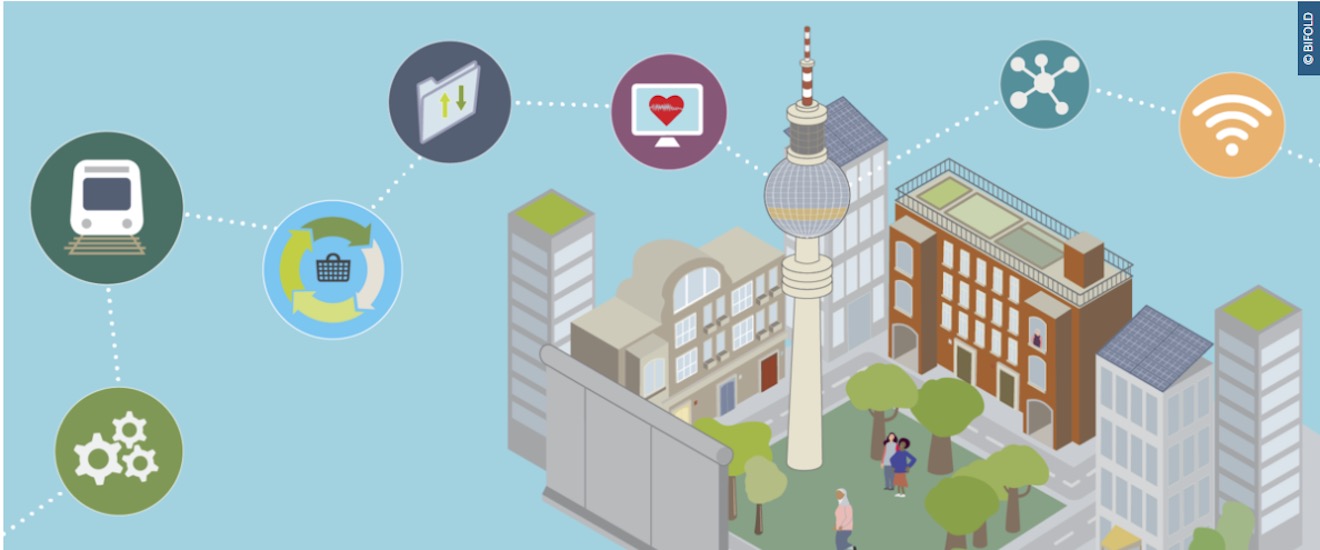Collaborative Summer School of Artificial Intelligence and Society 2024
AI and the Urban: Making cities smart(er)?
As Berlin navigates the complexities of modernizing public administration, adapting to climate change, and regulating the housing market, artificial intelligence (AI) emerges as a toolbox of potential solutions. The 2024 Summer School on AI and Society, organized by the Berlin Institute for the Foundations of Learning and Data (BIFOLD), the Weizenbaum Institute for the Networked Society, and Science of Intelligence (SCIoI), explores how AI can make cities more intelligent and sustainable.
Berlin’s urban landscape faces many challenges: from traffic planning and healthcare system efficiency to promoting sustainable lifestyles. AI-powered technology holds the promise of integrating sensor data to better understand spatial, temporal, and environmental developments, offering innovative design options. However, the deployment of AI solutions is resource-intensive, demanding substantial energy, water, and technical infrastructure. The complexity of urban systems necessitates a multidisciplinary approach grounded in a thorough understanding of (artificial) intelligence and ethical considerations.
A collaborative endeavor
The collaboration between Science of Intelligence, BIFOLD, and the Weizenbaum Institute emphasizes Berlin’s status as a hub of AI research and development. Each institution brings a wealth of expertise and a commitment to harnessing AI for societal benefit. While BIFOLD focuses on advancing AI technologies and their applications, the Weizenbaum Institute explores the societal implications of digital transformation, and SCIoI studies the fundamental principles of intelligence in natural and artificial systems under ethical considerations. This partnership is particularly timely given the recent surge in AI advancements, positioning Berlin at the forefront of important challenges of our time.
A platform for critical reflection
The Summer School provides a platform for exploring and critically reflecting on the prerequisites and impacts of new technologies. With a focus on sustainability, participants will assess AI’s dual role as an opportunity and a potential threat to sustainable urban development. The program’s transdisciplinary approach ensures that participants gain a holistic understanding of how AI can be ethically and effectively applied in smart cities. The five-day event, from 9 to 13 September, 2024, is designed for doctoral students passionate about machine learning, data management, and AI’s societal impact.The program includes keynote speeches from experts, in-depth lectures, practical workshops, and group projects, as well as several opportunities for both curated and unofficial networking.
Together with BIFOLD director Volker Markl, SCIoI Executive Board member Jörg Raisch will be opening the event with a welcome speech. SCIoI PI John-Dylan Haynes, a psychologist and neuroscientist, will contribute with a keynote speech titled “Human versus machine intelligence: Solving complex and dynamic real-world problems.” SCIoI researcher Asieh Daneshi will be leading the practical workshop on “Transforming Urban Cleanliness: Optimal Resource Allocation,” and SCIoI member Dafna Burema will be leading the practical workshop on “AI ethics: Cases of (ir)responsible AI deployment.”
Empowering the Next Generation
By bringing together experts and students from diverse fields, the Summer School aims to empower the next generation of AI researchers and practitioners. It emphasizes the importance of ethical considerations and sustainability in the development of smart cities, ensuring that AI technologies benefit society as a whole. By addressing pressing urban challenges through the lens of AI, this Summer School highlights the transformative power of AI technology, including ethical and sustainable principles. The collaboration between SCIoI, BIFOLD, and the Weizenbaum Institute exemplifies the strength of interdisciplinary partnerships in driving innovation. Participants will leave with a deeper understanding of AI’s role in urban development a network of peers and mentors.
For more information, visit Summer School at a Glance.





